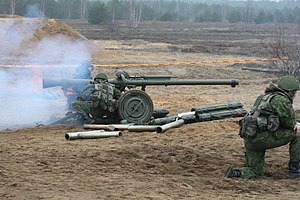Pvpj 1110
| Pvpj 1110 | |
|---|---|

PV-1110 in Lithuanian National Defence Volunteer Forces service
|
|
| Type | Recoilless rifle |
| Place of origin |
|
| Service history | |
| Used by | See Users |
| Production history | |
| Designed | 1950s |
| Manufacturer | Bofors |
| Produced | 1960 |
| Specifications | |
| Weight | Barrel: 120 kg (264 lb) With carriage: 260 kg (573 lb) |
| Length | 4.1 m (13 ft 5 in) |
| Barrel length | 3.69 m (12 ft 1 in) |
| Height | 0.47 m (1 ft 7 in) to 0.87 m (2 ft 10 in) depending on firing position |
| Crew | 3 |
|
|
|
| Shell | 90x760mm HEAT |
| Caliber | 90 mm |
| Elevation | -10 to +15° |
| Traverse | 75 to 115° |
| Rate of fire | 6 to 8 rpm |
| Muzzle velocity | 650-700 m/s (2,132-2,296 ft/s) depending on ammunition used |
| Effective firing range | 900 m (980 yd) |
| Sights | Optical with coaxial 7.62 mm Ljungman spotting rifle |
The Pvpj 1110 (Pansarvärnspjäs 1110) is a Swedish 90 mm recoilless rifle. It is also widely known as Pv-1110. It entered service at the early 1960s and was phased out of service in the Swedish Army in the late 1990s after 1,600 had been produced. Some 300 weapons were transferred to Estonia, Latvia and Lithuania.
The Pvpj 1100 was typically towed by, or mounted on, a Pvpjtgb 9031 Volvo truck. From the late 1970s it has also been mounted on the Tgb 1111 and the Bv 2062 tracked carrier.
For Arctic warfare it could also be fitted to a pulka and pulled by two skiers.
The Pvpj 1110 is fitted with an optical sight and has an iron sight as backup.
The type was used by the Irish Army in towed form, and experimentally fitted to the chassis of a Comet tank in place of the turret.
The Pvpj1110 is designed to fire HEAT rounds with tracers. The Swedish designation for these rounds is spårljuspansarspränggranat (slpsgr)
...
Wikipedia
